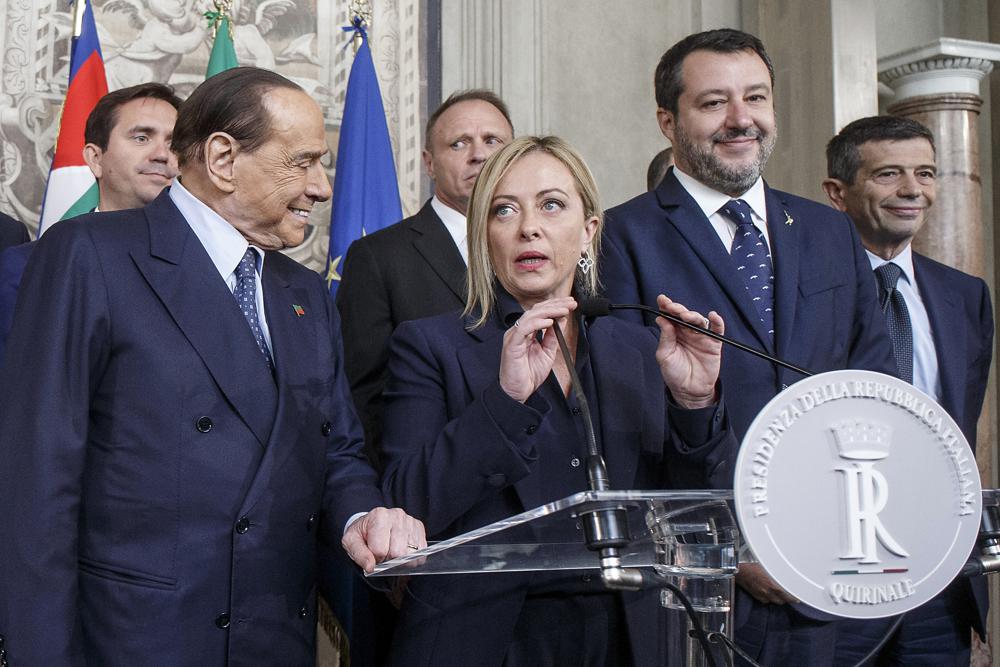
(Photo Credit: Roberto Monaldo / LaPresse via Associated Press)
…She is doing more than expected and asking for little applause…
The politics of Europe has massively shifted along with its leaders following the Russian invasion of Ukraine.
Prime Minister Rishi Sunak is the kind of technocrat that the U.K. and the Tory party may both be thankful for after the blunders of the Liz Truss’s administration and the death of Queen Elizabeth.
Prime Minister Olaf Scholz is not Angela Merkel (who arguably was the protector of international liberal order and head statewoman for the E.U.) but he has guided Germany through the winter with sufficient energy (at a high cost) and backed NATO efforts to support Ukraine.
President Emmanuel Macron arguably has stepped into head statesmen role for the E.U. (albeit with some controversy on his stances on China and Ukraine) and elevated the French voice on an international stage.
Quietly forgotten is Italian Prime Minister Giorgia Meloni, who is the leader of Europe’s 4th biggest economy (3rd largest in the E.U.) …she is arguably doing more than she receives credit for with a focus on three major areas of policy vital to Italy and the greater Europe.
European Energy
Prime Minister Meloni is still running with the plans of former prime minister Mario Draghi, who quickly cut Russian imports and sought to diversify resources in the initial months of the Russian invasion of Ukraine. Draghi signed an energy supply deal with Algerian President Abdelmadjid Tebboune with Algiers promising to deliver an additional 9 bcms of gas on top of the 21 annual bcms already provided via the TransMed pipeline.
It was these types of deals that the Draghi administration pursued with the active participation of the CEO of energy major Eni, Claudio Decalzi, with trips to Angola, Congo, and Qatar in addition to Algeria.
With Meloni now facilitating discussions, Eni recently struck a $8 billion deal with Libya in January to further strengthen supply to Italy as well as invest in carbon capture and solar energy projects in the country. Meloni has also made another visit to Algeria while other officials and diplomats have stopped in Azerbaijan, Tunisia, and Turkey.
Her administration is working to find the right balance between sourcing stronger strategic partners for gas in the short term and developing renewable projects for the long term to bridge Italy to its net-zero goals. If Meloni can push for more drilling at home (which is a delicate request within local Italian politics) in addition to the deals and drilling abroad, she could quietly transform Italy into a European energy hub.
Migration from North Africa
Prime Minister Meloni and her Brothers of Italy party have long viewed a reduction in immigration as a key part of their agenda. The rate at which migrants are reaching the country by sea hit its highest peak for any previous winter and now for any early spring…there are days when more than 1,000 people land ashore (there were six of these days in March alone).
The situation is “unprecedented”, as described by Meloni, and is very much similar to the crisis faced by the United States on its southern border, however without international appreciation for the cost on the Italian system despite potentially surpassing migrant levels seen during the peaks of 2015 and 2016 as conflict devastated Afghanistan and Syria. Europe has invested billions since 2016 in building up fences, the coast guard, and support to countries from which the migrants originate. The spending, however, has clearly not changed the situation.
Meloni continues to press the E.U. for more action on the issue. While Italy (and Greece) may feel most of the pain, it cannot bear a disproportionate share of the cost in combatting a migrant crisis. The country has a ballooning pension bill with an ageing population, low birth rate, and an overall mismatch between taxpayers and pension collectors.
Thus, more immigrants who are tax paying can be beneficial to the system…the Brothers of Italy may win more support by arguing the country requires the right balance of skilled and unskilled taxpaying immigrants. However, Meloni has stuck to the narrative of migrants overwhelming the system (which is true). Can she shift the narrative to attracting the right type of immigrants (i.e., skills based) that benefit her party’s economic vision for the country?
It should not be ignored that the “energy trips” to north Africa are always more dynamic than simply investing in more gas production and obviously delve into other issues such as immigration…Maybe Meloni can take a page out of the Bersculoni-Gaddafi accords and negotiate greater cooperation on an aggregate of issues with Libya and related partners in north Africa.
Russia and Ukraine
Prime Minister Meloni is an anomaly for European ‘far-right’ leaders in this area. Far-right politicians, such as Marine Le Pen in France and Hungarian Prime Minister Victor Orban, have attempted to walk a tight line between not obstructing European efforts against Russia in Ukraine and maintaining a connection to (or not fully contradicting) Russian leader Vladimir Putin.
However, Meloni public messaging has become pro-Europe, pro-U.S., and anti-Russia despite polls suggesting that military aid to Ukraine (among other things) is unpopular with voters and potentially unpopular with members in her conservative coalition who were previously or currently remain supporters of Putin.
Forza Italia leader and former prime minister Silvio Berlusconi, for example, is an old friend of Putin and recently blamed Ukrainian President Volodymyr Zelenskyy for provoking the war. League leader and deputy prime minister Matteo Salvini previously stated admiration for Putin. Still, both Forza Italia and the League supported Meloni on supplying weapons to Ukraine. Meloni’s ability to maintain support amongst her conservative coalition for Ukraine may cost her the most at home…Europe should ultimately recognize this support from her far-right coalition is both a political sacrifice and a demonstration of her showing up for Europe.
